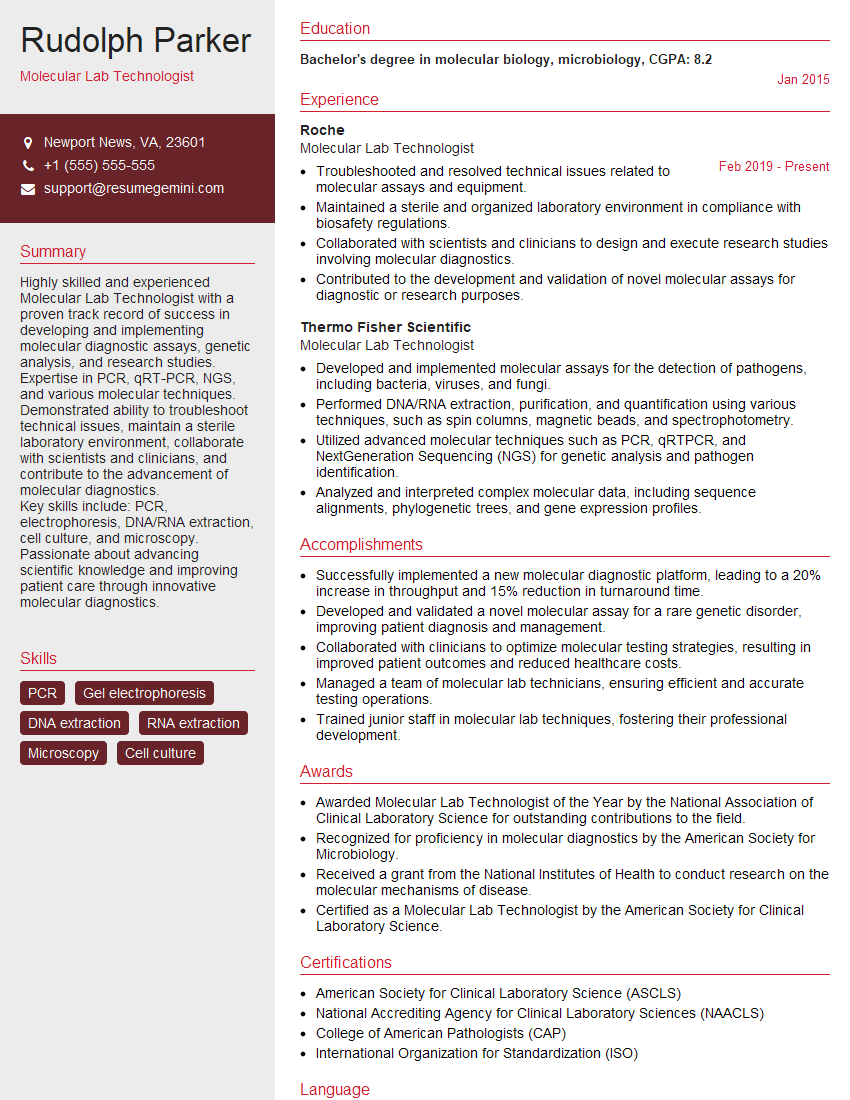Are you a seasoned Molecular Lab Technologist seeking a new career path? Discover our professionally built Molecular Lab Technologist Resume Template. This time-saving tool provides a solid foundation for your job search. Simply click “Edit Resume” to customize it with your unique experiences and achievements. Customize fonts and colors to match your personal style and increase your chances of landing your dream job. Explore more Resume Templates for additional options.

Rudolph Parker
Molecular Lab Technologist
Summary
Highly skilled and experienced Molecular Lab Technologist with a proven track record of success in developing and implementing molecular diagnostic assays, genetic analysis, and research studies. Expertise in PCR, qRT-PCR, NGS, and various molecular techniques. Demonstrated ability to troubleshoot technical issues, maintain a sterile laboratory environment, collaborate with scientists and clinicians, and contribute to the advancement of molecular diagnostics.
Key skills include: PCR, electrophoresis, DNA/RNA extraction, cell culture, and microscopy. Passionate about advancing scientific knowledge and improving patient care through innovative molecular diagnostics.
Education
Bachelor’s degree in molecular biology, microbiology
January 2015
Skills
- PCR
- Gel electrophoresis
- DNA extraction
- RNA extraction
- Microscopy
- Cell culture
Work Experience
Molecular Lab Technologist
- Troubleshooted and resolved technical issues related to molecular assays and equipment.
- Maintained a sterile and organized laboratory environment in compliance with biosafety regulations.
- Collaborated with scientists and clinicians to design and execute research studies involving molecular diagnostics.
- Contributed to the development and validation of novel molecular assays for diagnostic or research purposes.
Molecular Lab Technologist
- Developed and implemented molecular assays for the detection of pathogens, including bacteria, viruses, and fungi.
- Performed DNA/RNA extraction, purification, and quantification using various techniques, such as spin columns, magnetic beads, and spectrophotometry.
- Utilized advanced molecular techniques such as PCR, qRTPCR, and NextGeneration Sequencing (NGS) for genetic analysis and pathogen identification.
- Analyzed and interpreted complex molecular data, including sequence alignments, phylogenetic trees, and gene expression profiles.
Accomplishments
- Successfully implemented a new molecular diagnostic platform, leading to a 20% increase in throughput and 15% reduction in turnaround time.
- Developed and validated a novel molecular assay for a rare genetic disorder, improving patient diagnosis and management.
- Collaborated with clinicians to optimize molecular testing strategies, resulting in improved patient outcomes and reduced healthcare costs.
- Managed a team of molecular lab technicians, ensuring efficient and accurate testing operations.
- Trained junior staff in molecular lab techniques, fostering their professional development.
Awards
- Awarded Molecular Lab Technologist of the Year by the National Association of Clinical Laboratory Science for outstanding contributions to the field.
- Recognized for proficiency in molecular diagnostics by the American Society for Microbiology.
- Received a grant from the National Institutes of Health to conduct research on the molecular mechanisms of disease.
- Certified as a Molecular Lab Technologist by the American Society for Clinical Laboratory Science.
Certificates
- American Society for Clinical Laboratory Science (ASCLS)
- National Accrediting Agency for Clinical Laboratory Sciences (NAACLS)
- College of American Pathologists (CAP)
- International Organization for Standardization (ISO)
Career Expert Tips:
- Select the ideal resume template to showcase your professional experience effectively.
- Master the art of resume writing to highlight your unique qualifications and achievements.
- Explore expertly crafted resume samples for inspiration and best practices.
- Build your best resume for free this new year with ResumeGemini. Enjoy exclusive discounts on ATS optimized resume templates.
How To Write Resume For Molecular Lab Technologist
- Highlight your expertise in molecular techniques, particularly PCR, qRT-PCR, and NGS.
- Quantify your accomplishments with specific metrics, such as the number of assays developed or the sensitivity and specificity of diagnostic tests.
- Emphasize your ability to troubleshoot and resolve technical issues independently.
- Showcase your experience in data analysis and interpretation, including proficiency in bioinformatics tools.
- Demonstrate your commitment to maintaining a safe and compliant laboratory environment.
Essential Experience Highlights for a Strong Molecular Lab Technologist Resume
- Developed and implemented molecular assays for the detection and identification of pathogens, including bacteria, viruses, and fungi
- Performed DNA/RNA extraction, purification, and quantification using spin columns, magnetic beads, and spectrophotometry
- Utilized advanced molecular techniques such as PCR, qRT-PCR, and NGS for genetic analysis and pathogen characterization
- Analyzed and interpreted complex molecular data, including sequence alignments, phylogenetic trees, and gene expression profiles
- Troubleshooted and resolved technical issues related to molecular assays and equipment
- Maintained a sterile and organized laboratory environment in compliance with biosafety regulations
- Collaborated with scientists and clinicians to design and execute research studies involving molecular diagnostics
Frequently Asked Questions (FAQ’s) For Molecular Lab Technologist
What is the primary role of a Molecular Lab Technologist?
The primary role of a Molecular Lab Technologist is to perform molecular assays and techniques to detect, identify, and characterize pathogens and genetic material.
What are the key skills required for this position?
Key skills include expertise in PCR, qRT-PCR, NGS, DNA/RNA extraction, and data analysis. Strong laboratory skills, attention to detail, and problem-solving abilities are essential.
What kind of educational background is necessary?
A Bachelor’s degree in molecular biology, microbiology, or a related field is typically required. Additional training or experience in molecular diagnostics is highly valued.
What are the career prospects for Molecular Lab Technologists?
Molecular Lab Technologists are in high demand due to the increasing use of molecular diagnostics in healthcare, research, and industry. Career advancement opportunities include supervisory roles, research positions, and specialized certifications.
What are the challenges associated with this profession?
The profession requires a high level of technical expertise and the ability to work independently. Keeping up with rapidly evolving technologies and ensuring accurate results can be challenging.
What are the typical work environments for Molecular Lab Technologists?
Molecular Lab Technologists typically work in laboratories in hospitals, research institutions, diagnostic companies, and pharmaceutical industries.